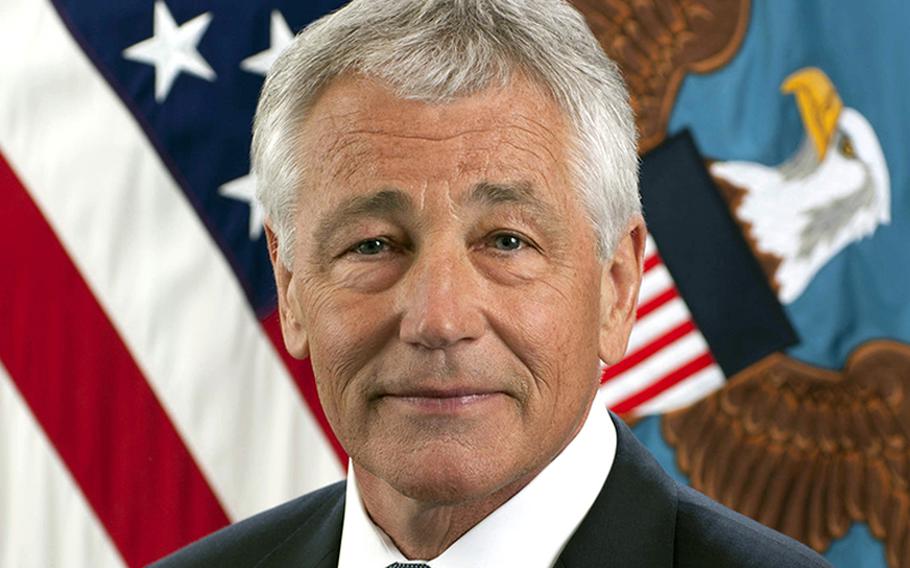
Secretary of Defense Chuck" Hagel. (DOD)
KABUL – Newly sworn-in Defense Secretary Chuck Hagel arrived unannounced here Friday, where he said he would meet with commanders and combat troops in an effort to better understand the war he is now responsible for bringing to a close.
It is the first foreign trip and first visit to Afghanistan as defense secretary for Hagel, a twice-wounded veteran of Vietnam, whose service in the earlier conflict helped shape his opposition to widening the wars in Iraq and Afghanistan.
But in a press conference aboard a military aircraft en route to the war zone, the former Nebraska senator dismissed specific comparisons between Vietnam and Afghanistan.
“There are always parallels to any war,” he said.
Hagel, who has traveled several times to Afghanistan since 2002 – most recently in 2008 with then-Senator Barack Obama – said his first priority was to deliver personal thanks to U.S. troops in the country. Next, he said he would meet with recently installed Afghan war commander Gen. Joseph Dunford and other top leaders.
“I need to better understand what’s going on there,” Hagel said. “I need to talk to, to listen to, get a good sense from our commanders on the ground.”
Hagel also planned to meet with Afghan officials over the weekend, including the ministers of defense and the interior, and President Hamid Karzai, who in recent weeks has clamped down on U.S. support operations for Afghan troops.
After a U.S. airstrike killed 10 civilians last month in Kunar province, Karzai issued a ban on Afghan troops calling for U.S. air support in populated areas. Then in late February, responding to reports of kidnappings and killings that villagers in Wardak province blamed on American troops – a charge NATO officials vigorously denied – Karzai ordered U.S. special operations forces out of the province.
U.S. commanders reportedly are trying to talk Karzai out of the Wardak order, which strikes at the heart of the U.S. strategy of providing training and support while steadily transitioning security responsibility to Afghans in preparation for the end of NATO combat operations in December 2014.
Hagel said the topic would be on the table when he meets with Karzai.
“I look forward to talking to the president about many issues, and that certainly, I’m sure, will be one of them,” Hagel said.
The dustup with Karzai highlights the difficulties faced by Hagel as he tries to implement the U.S. strategy while overseeing the withdrawal of troops from a war that is widely unpopular with the U.S. public and lawmakers.
“That transition has to be done right, it has to be done in partnership with the Afghans, with our allies,” Hagel said. “Our country, as well as Afghanistan, the region and our allies have a lot at stake here.”
Nearly 68,000 U.S. troops remain in Afghanistan. About half will be withdrawn after the current fighting season, leaving about 34,000 to provide security for the Afghan elections in April 2014, according to Leon Panetta, Hagel’s predecessor as defense secretary. A final troop drawdown will commence after the elections, Panetta said at a NATO meeting in Brussels last month.
In a written message to coalition personnel released Friday, Hagel said the Afghan campaign is winding toward a successful end, but it’s not over.
“Even as we move into more of a support role, this remains a dangerous and difficult mission,” he said. “We are still at war, and many of you will continue to experience the ugly reality of combat and the heat of battle. But the goal we have established – to have Afghans assume full responsibility for security at the end of 2014 – is clear and achievable.”
Obama has not decided on the size of a post-2014 force to conduct counterterrorist operations against al-Qaida and train Afghan troops, Hagel told reporters en route to Kabul. In Brussels last month, Panetta suggested the administration was looking at a combined force of the U.S. and its allies of 8,000 to 12,000 troops.
In Congressional testimony this week, however, the outgoing commander of U.S. Central Command, Gen. James Mattis, recommended 20,000 troops.
Hagel said he and the president want to hear a variety of perspectives on post-2014 requirements.
“Only then can we arrive with our allies and with the Afghans to the right number and the right reasons to carry out the missions (to which) we’re committed ... as we conduct this responsible transition,” he said.
Email: Carroll.Chris@stripes.com Twitter: @ChrisCarroll_